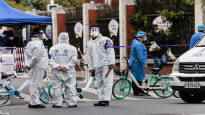In the city restrictions eased somewhat – in some areas people have access to trade once a day.
12.4. 09:53 • Updated April 12th. 10:58
In Shanghai, a large proportion of the city’s population of about 26 million is still closed to their homes.
People who have been in their homes for a couple of weeks have complained that the distribution of food is badly hampered. In some residential areas, people have shouted for help from their apartments based on videos uploaded to social media.
Shanghai authorities have announced that restrictions will be eased in areas where no new infections have been detected for two weeks.
People are allowed to leave their homes, but their movement is still restricted. According to AFP news agency, in one area, the relief has been interpreted as allowing people to leave their homes once a day to go shopping.
On Tuesday, 23,000 new infections were reported in Shanghai, most of them asymptomatic.
The United States is evacuating its personnel
The United States has ordered non-essential staff from the Shanghai consulate to leave the city due to the difficult situation.
Already last week, the United States allowed some workers to leave voluntarily.
The United States has also urged its citizens to avoid traveling to Shanghai and Hong Kong, among other places, because it says the corona regulations are being applied arbitrarily. For example, there is a risk that children will be separated from their parents in cases of infection.
News agencies have reported that children who test positive have been consistently isolated from their parents. According to the authorities, parents can now in some cases come with the infected child to an isolation center.
China believes the allegations are unfounded
China has reacted angrily to U.S. evacuation decisions and a travel recommendation. Foreign Ministry spokesman Zhao Lijianin China opposes unfounded allegations by the U.S. against the epidemic.
Interest rate restrictions are already having serious consequences for the Chinese economy.
According to data from the Japanese investment bank Nomura, 45 Chinese cities have varying degrees of interest rate blockages. Nomura estimates that cities subject to severe restrictions produce 40 percent of China’s GDP.
